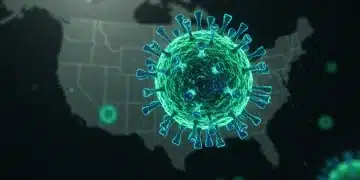Seek health subsidy programs and uncover new opportunities

Seeking health subsidy programs provides individuals and families access to affordable healthcare services, improving overall health outcomes and community well-being through financial assistance and localized resources.
Seek health subsidy programs can open doors to financial assistance, allowing more people to access crucial healthcare services. Have you considered how these programs might benefit you or someone you know?
Understanding health subsidy programs
Understanding health subsidy programs is essential for anyone looking to improve their access to healthcare services. These programs are designed to help individuals and families afford necessary healthcare without overwhelming financial strain. Through these subsidies, low-income individuals can access a variety of medical services, ensuring that healthcare is a right, not a privilege.
What Are Health Subsidy Programs?
Health subsidy programs are financial assistance initiatives provided by the government or private organizations. They aim to make healthcare affordable for those who might struggle to pay for medical services. Understanding these programs can empower individuals to take charge of their health.
Key Features of Health Subsidy Programs
- Financial assistance for medical services.
- Eligibility based on income and family size.
- Covers a range of healthcare services, including outpatient and inpatient care.
- May include additional support for medications.
Many individuals wonder how to qualify for these programs. The eligibility criteria often depend on several factors, including income levels and household composition. For instance, a single parent working low wages may qualify for more subsidy support compared to someone with a higher income. These distinctions help target assistance where it is most needed, ensuring that healthcare remains within reach for everyone.
Once you understand the types of health subsidy programs available, it’s crucial to know how to apply. Usually, the application process involves filling out forms, providing documentation of income, and understanding your local or state requirements. If you’re thinking about applying, don’t hesitate to gather necessary documents and reach out for help if needed. Many community organizations offer assistance with applications, guiding you through each step.
The impact of health subsidy programs reaches far beyond just individuals; they create healthier communities as a whole. When people can afford healthcare, they are more likely to seek preventive measures. This can lead to early detection of diseases and reduce long-term healthcare costs for everyone.
In summary, understanding health subsidy programs empowers individuals to access necessary healthcare. They demystify the process and encourage communities to come together to support one another in maintaining good health.
Eligibility criteria for health subsidies
Eligibility criteria for health subsidies are essential to understand for anyone interested in accessing financial assistance for healthcare. Knowing whether you qualify can help you navigate these programs effectively and gain the support you need.
Common Requirements
Most health subsidy programs have specific criteria that applicants must meet. These criteria usually focus on income levels, household size, and sometimes, residency status. The purpose of these conditions is to ensure that those who truly need help receive it.
Income Requirements
- Eligibility often considers annual income in relation to the federal poverty level.
- Programs may have varying income limits based on family size.
- Some subsidies provide more support for lower-income households.
Your income will have a direct impact on whether you qualify for health subsidies. For example, individuals earning below a certain threshold may receive full coverage or larger subsidies. Assessing your financial situation can help you understand your eligibility more clearly.
In addition to income, other factors can influence eligibility. For instance, age and disability status can play significant roles. Some programs may prioritize assistance for the elderly or those with disabilities. Additionally, applicants often need to provide proof of U.S. residency to qualify for specific subsidies.
Family Size Considerations
Family size significantly affects subsidy eligibility. The more people in a household, the higher the income limit may be for qualifying. For instance, a family of four may have a higher threshold compared to a single applicant. This approach ensures that families can access the proper resources while considering their needs.
It’s important to gather all pertinent information when applying for health subsidies. Documentation can include pay stubs, tax returns, and proof of residency. Having these ready can streamline the process and increase your chances of approval.
In summary, understanding the eligibility criteria for health subsidies is crucial for accessing necessary healthcare. By being aware of what is required, you can take steps to ensure you qualify and receive the support you need.
How to apply for health subsidy programs

How to apply for health subsidy programs can seem daunting, but with the right steps, you can navigate the process smoothly. Knowing what to expect can empower you to take action and access the support available.
Gather Necessary Documents
The first step in applying for health subsidy programs is to collect all required documents. Some common documents include proof of income, tax returns, and identification. Having these ready will help speed up the application process.
Understanding the Application Process
- Start by researching available health subsidy programs in your state.
- Visit the official website of the program for specific guidelines.
- Complete the application form accurately, ensuring all information is correct.
When you fill out the application, it is critical to double-check your information. Small errors can lead to delays in processing. If you have questions, do not hesitate to ask a local community organization or a healthcare provider for help. They often have resources available to assist applicants.
After submitting your application, it may take some time to receive a response. During this waiting period, make sure to keep any confirmation documents you receive. These will help you track your application status. Know that you can follow up with the program’s office if necessary.
What Happens After You Apply?
Once your application is processed, you will receive a notification. If approved, the program will inform you about the coverage you are entitled to and any next steps regarding enrollment. If your application is denied, you have the right to understand why and may appeal the decision.
Stay informed about deadlines for reapplying or appealing, as each program can have different rules. It’s important to adhere to those timelines to ensure you do not miss out on assistance when you need it most.
Applying for health subsidy programs doesn’t have to be overwhelming. With preparation and an understanding of the process, you can take advantage of features designed to assist you and your family.
Impact of health subsidies on communities
Impact of health subsidies on communities is significant, as these programs help improve overall health and well-being. They not only aid individuals but also contribute positively to the community as a whole.
Improved Access to Healthcare
Health subsidies increase access to necessary healthcare services, especially for low-income families. When individuals can afford medical care, they are more likely to seek preventive services and treatment for chronic conditions. This shift leads to overall better health outcomes and can reduce the burden on emergency services.
Economic Benefits
- Health subsidies can lower out-of-pocket expenses for individuals.
- With reduced financial stress, families can allocate their resources more effectively.
- Improved health leads to higher productivity in the workplace.
When families experience less financial strain due to health care expenses, they often spend their money on other local goods and services. This boost in spending can revitalize local economies and create job opportunities.
Moreover, when communities gain better health outcomes, there is a reduction in absenteeism in schools and workplaces. Children who have access to health services are more likely to attend school and perform better academically. Healthy adults are also more likely to be present and productive at work, which benefits the local economy.
Strengthening Community Ties
Health subsidies facilitate greater community involvement. When people can access healthcare, they are more likely to engage with local resources, attend health fairs, and participate in community health initiatives. This engagement builds stronger community ties and fosters a culture of support and awareness around health issues.
Additionally, health subsidy programs often encourage collaboration between healthcare providers and community organizations. These partnerships can lead to innovative approaches to addressing health disparities, providing comprehensive education, and promoting healthier lifestyles.
In summary, the impact of health subsidies on communities is profound. By improving access to healthcare, driving economic growth, and strengthening community bonds, these programs play a crucial role in building healthier, more resilient communities.
Resources for finding health subsidy programs
Resources for finding health subsidy programs are essential for individuals seeking financial assistance for healthcare. Understanding where to look can make the process much easier.
Online Resources
The internet is a valuable tool for discovering health subsidy programs. Websites like HealthCare.gov provide comprehensive information on various programs available in each state. Here, you can find details about eligibility, benefits, and how to apply. In addition, many nonprofit organizations maintain lists of local health subsidy options that cater to specific communities and demographics.
Local Assistance Programs
- Contact your local health department for guidance.
- Community centers often have information on health subsidies.
- Speak with local healthcare providers; they may have resources or connections to programs.
Community health centers and local clinics can also direct you to assistance programs. Often, these centers have staff trained to help individuals navigate the options available. They can provide one-on-one support and answer any questions you might have about the application process.
State and Federal Programs
Each state has its own health subsidy programs. Checking with your state’s health department or website can yield specific information. Many states also offer Medicaid and CHIP (Children’s Health Insurance Program) for eligible families. Additionally, federal programs, like Medicare, are essential for qualifying individuals over a certain age or with specific disabilities.
Local libraries sometimes hold health resource fairs or workshops that can connect individuals with subsidy resources. Attending these events can provide valuable information and access to representatives from various programs.
Being proactive in searching for health subsidy programs will pay off. Utilizing multiple resources can help ensure that you find the best options that fit your needs. Understanding what is available can lead you to make informed decisions about your healthcare and financial well-being.
In conclusion, understanding health subsidy programs is highly beneficial for individuals and families seeking affordable healthcare. These programs play a crucial role in improving access to medical services, enhancing community health, and supporting economic stability. By utilizing available resources, applicants can navigate the application process more easily, ensuring they receive the support needed. Awareness and participation in these programs lead to healthier lives and stronger communities.
FAQ – Frequently Asked Questions about Health Subsidy Programs
What are health subsidy programs?
Health subsidy programs are financial assistance initiatives designed to help individuals and families access affordable healthcare services.
Who is eligible for health subsidies?
Eligibility for health subsidies usually depends on factors like income, family size, and sometimes, residency status.
How can I apply for a health subsidy program?
You can apply for health subsidy programs online through official state or federal websites or by visiting local health departments and community centers.
What resources are available to help me find health subsidy programs?
Resources include online databases, local health departments, community health centers, and nonprofit organizations that provide information on available programs.





